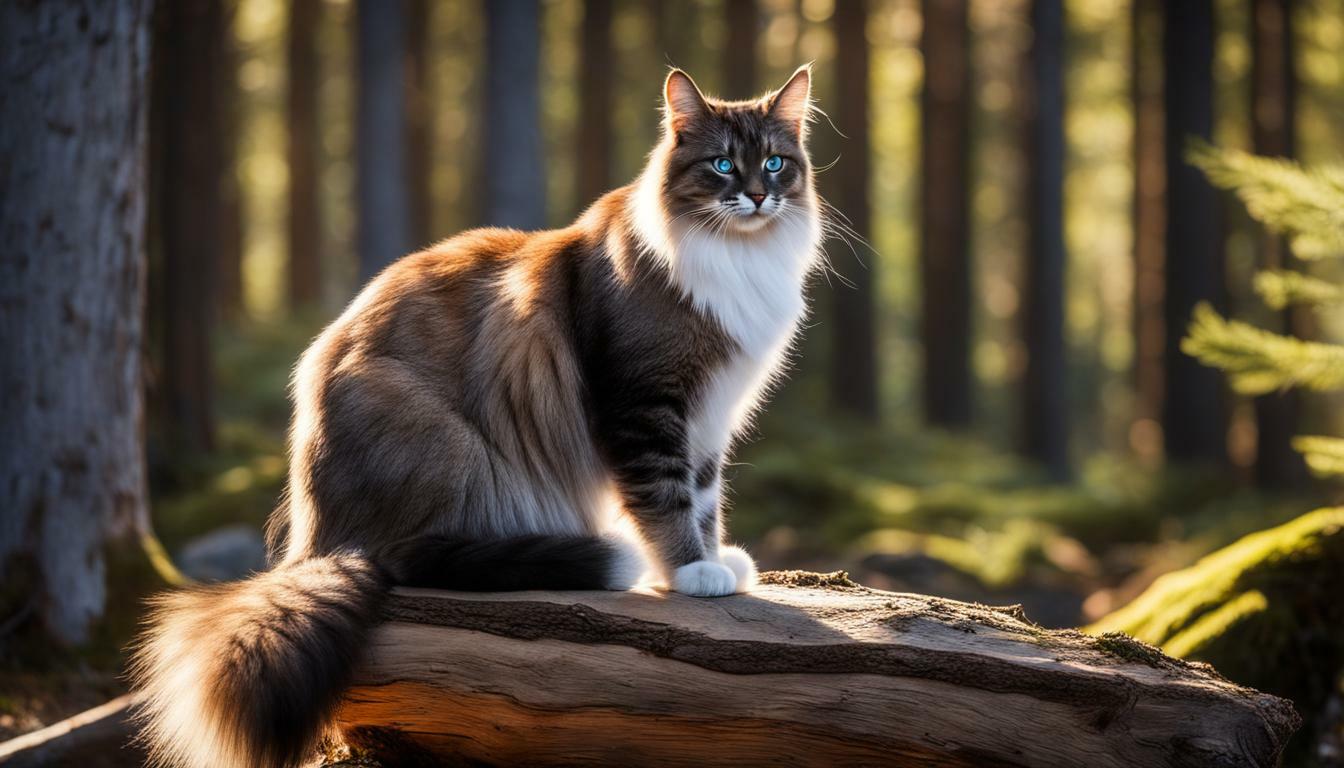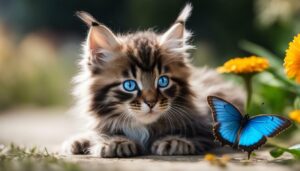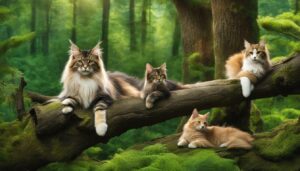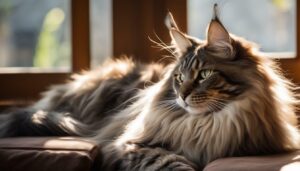Dive into the world of Maine Cats with me, explore their amazing qualities, and discover why these fluffy felines are a purr-fect favorite for cat lovers.
Key Takeaways:
- Maine Coon cats are a large domesticated cat breed originating from Maine, United States.
- They are known as “gentle giants” due to their size and sociable nature.
- Maine Coons have a dense coat of fur, which helps them survive in harsh climates.
- They belong to the Western European monophyletic cat branch, according to phylogenetic studies.
- Maine Coon cats were popular in the late 19th century but faced a decline before making a comeback as the third most popular cat breed.
The Origin of Maine Cats
The Maine Cats, also known as Maine Coon cats, have a fascinating history that traces back to their origins in Maine, United States. These gentle giants have captured the hearts of many cat lovers worldwide with their unique characteristics and charming personality.
While there are several myths and theories surrounding their origin, phylogenetic studies have revealed that Maine Coon cats belong to the Western European monophyletic cat branch. This suggests that they likely descended from European cats brought to America by early settlers.
In the late 19th century, Maine Coon cats gained popularity in cat shows, showcasing their striking appearance and friendly nature. However, with the introduction of other long-haired breeds, their popularity declined for a period of time. Fortunately, they made a comeback and are now the third most popular cat breed in the United States.
Maine Coon cats are easily recognizable by their distinctive physical features. They have a large and robust build, with a prominent ruff around their neck, large paws, and a long, bushy tail. Their coat is dense and helps them stay warm in harsh climates, which may have contributed to their survival and adaptation in the state of Maine.
| Maine Cat Characteristics |
|---|
| Larger size compared to most other cat breeds |
| Dense fur to withstand cold weather |
| Distinctive appearance with a ruff, large paws, and a bushy tail |
| Laid-back and affectionate temperament |
Maine Cats come in various colors and patterns, adding to their unique charm. They are known for their sociable and friendly nature, often seeking attention from their human companions. It’s no wonder these cats have become beloved members of many households.
While Maine Coon cats are generally healthy, they can be prone to certain conditions like feline hypertrophic cardiomyopathy and hip dysplasia. Regular grooming is essential to maintain their beautiful coat, as well as routine vet check-ups to ensure their overall health and well-being.
These cats are not only known for their physical attributes but also for their vocal and playful nature. They enjoy interactive playtime with their owners and can even be trained to perform tricks, showcasing their intelligence and adaptability.
Popularity and Evolution of Maine Cats
Despite facing a decline, Maine Cats have made a remarkable comeback and are now widely sought after by cat enthusiasts, thanks to the efforts of dedicated breeders and adoption/rescue organizations. The rise and fall in popularity of this unique breed can be attributed to various factors, including changes in cat show preferences and the introduction of other long-haired breeds.
In the late 19th century, Maine Cats, also known as Maine Coon cats, were favorites in cat shows due to their distinctive appearance and friendly temperament. However, with the introduction of new long-haired breeds, the popularity of Maine Cats started to decline. This decline continued for many years, and at one point, there was even speculation that the breed might become extinct.
Fortunately, passionate breeders and dedicated organizations stepped in to save the breed. Through careful breeding programs and a focus on preserving the breed’s unique characteristics, Maine Cats began to regain their popularity. Today, they are the third most popular cat breed, beloved for their gentle nature, striking appearance, and affectionate personality.
The resurgence of Maine Cats can also be attributed to the efforts of adoption and rescue organizations. These organizations provide homes for Maine Cats in need, helping to increase awareness and showcase the many benefits of this wonderful breed. Through their tireless work, they ensure that Maine Cats have a second chance at finding loving families who appreciate their charm and companionship.
| Maine Cat Adoption | Maine Cat Breeders | Maine Cat Rescue |
|---|---|---|
| Adoption organizations play a crucial role in finding homes for Maine Cats in need. They provide support, care, and a safe environment for abandoned or neglected Maine Cats until they can be adopted into loving homes. | Dedicated breeders have played a significant part in preserving and promoting the Maine Cat breed. They carefully select and breed Maine Cats to ensure they meet breed standards and maintain their unique characteristics. | Rescue organizations focus on saving Maine Cats from dire situations such as abuse, neglect, or abandonment. They provide medical care, rehabilitation, and find forever homes where these cats can thrive and receive the love they deserve. |
Distinctive Characteristics of Maine Cats
Maine Cats are instantly recognizable with their impressive size, majestic appearance, and friendly nature. Known as the “gentle giants” of the cat world, they are one of the largest domesticated cat breeds, with males weighing up to 18 pounds or more, and females slightly smaller. Their large build and muscular bodies give them a commanding presence that sets them apart from other breeds.
One of the defining features of Maine Cats is their luxurious and dense coat of fur, which provides excellent insulation against the cold. Their fur is water-resistant, allowing them to navigate through wet and snowy conditions with ease. The coat comes in various colors and patterns, including tabby, solid, and tortoiseshell, adding to their visual appeal.
In addition to their physical attributes, Maine Cats are known for their friendly and sociable nature. They are often described as being dog-like in their behavior, forming strong bonds with their human companions and getting along well with other pets. Their affectionate temperament makes them wonderful family pets, and they are particularly gentle and patient with children.
Despite their large size, Maine Cats are surprisingly agile and are known for their playful nature. They enjoy interactive toys and games, and their intelligence makes them easily trainable. Many Maine Cats can learn tricks, such as fetching and walking on a leash, further enhancing their bond with their owners.
| Maine Cats | Distinctive Characteristics |
|---|---|
| Size | Impressively large, muscular bodies |
| Coat | Dense, water-resistant, with various colors and patterns |
| Temperament | Friendly, sociable, and affectionate |
| Playfulness | Highly playful and intelligent, easily trainable |
Overall, Maine Cats possess a unique combination of physical and behavioral traits that make them beloved companions for cat lovers. Their size, striking appearance, and gentle nature make them stand out in the feline world, while their sociable and playful disposition endears them to both individuals and families. Whether you’re looking for a furry friend to cuddle with or a companion to engage in active play, Maine Cats offer the perfect balance of charm and companionship.
Health and Care Tips for Maine Cats
Taking care of a Maine Cat involves understanding their specific health needs, grooming requirements, and providing the best possible care to ensure their well-being. These gentle giants require regular veterinary check-ups to monitor their overall health and detect any potential issues at an early stage. The most common health concerns for Maine Coon cats include feline hypertrophic cardiomyopathy and hip dysplasia. It is important to consult with a reputable veterinarian to establish a comprehensive healthcare plan for your Maine Cat.
Grooming is another essential aspect of Maine Cat care. Their dense fur requires regular brushing to prevent matting and the shedding of loose hair. Additionally, periodic bathing can help keep their coats clean and healthy. To minimize the risk of dental problems, it is recommended to brush their teeth regularly and provide appropriate dental chews or treats. Lastly, maintaining a nutritious diet that supports their unique needs is crucial for their overall well-being. Consult with your veterinarian to determine the best diet plan for your Maine Cat.
Recommended Diet for Maine Cats:
| Food Type | Amount | Feeding Frequency |
|---|---|---|
| Dry Cat Food | 1/2 to 3/4 cup | Twice a day |
| Wet Cat Food | 1/4 to 1/2 cup | Once a day |
| Treats | As a reward | Occasionally |
Maine Cats are known for their playful nature, so it is important to provide them with enough mental and physical stimulation. Interactive toys and scratching posts can help satisfy their natural instincts and prevent boredom. Creating a safe and enriching environment for your Maine Cat will contribute to their overall happiness and well-being. Remember to spend quality time bonding with your furry friend through play and affection.
With their friendly and sociable temperament, Maine Cats thrive in a loving and nurturing environment. They enjoy being part of the family and are known to get along well with children and other pets. Providing a comfortable and cozy sleeping area, along with regular social interaction, will ensure that your Maine Cat feels secure and loved.
Maine Cat Behavior and Training
Maine Cats are known for their endearing behaviors, from their playful antics to their vocal nature, making them a delightful addition to any cat-loving household. These gentle giants have a reputation for being social and affectionate, often seeking out the company of their human companions. They enjoy interactive play sessions and are known to be quite agile despite their large size, often displaying acrobatic moves that will surely entertain and amuse you.
If you’re considering adding a Maine Cat to your family, it’s essential to understand their unique behavior and provide the appropriate mental and physical stimulation they need. These cats are intelligent and curious, so it’s important to offer them plenty of enrichment activities and interactive toys to keep their minds stimulated. Puzzle toys, feather wands, and scratching posts are all great options to keep your Maine Cat engaged and entertained.
Training your Maine Cat
Maine Cats are highly trainable and can learn a variety of tricks and commands with patience and positive reinforcement. Start training early on and make it a fun and rewarding experience for your furry friend. Use treats as rewards and praise them lavishly when they perform the desired behavior. Remember to keep training sessions short and frequent to maintain their focus and motivation.
Some training techniques that work well with Maine Cats include clicker training, which uses a clicking sound to mark the desired behavior, and target training, where the cat is trained to touch a specific object. These techniques can be used to teach your Maine Cat simple tricks like sit, stay, and even fetch. Always remember to be patient and consistent, as it may take some time for your cat to understand and respond to the training cues.
| Training Tips for Maine Cats: |
|---|
| Start training early to establish good behaviors. |
| Use positive reinforcement techniques, such as treats and praise. |
| Keep training sessions short and frequent for better focus. |
| Use clicker training or target training to teach tricks and commands. |
| Be patient and consistent throughout the training process. |
With the right approach, your Maine Cat can become a well-behaved and responsive member of your household. Remember to shower them with love, attention, and plenty of playtime to keep their spirits high and their behavior in check.
Conclusion
Maine Cats are truly exceptional felines, captivating hearts with their stunning appearance, gentle nature, and unique qualities. Originating from Maine, United States, these gentle giants have a rich history and a prominent place in the hearts of cat lovers.
With their dense coat of fur and robust physique, Maine Cats are well-suited to surviving harsh climates. While there are myths and theories about their origin, recent scientific studies have revealed that they belong to the Western European monophyletic cat branch.
Although Maine Coon cats faced a decline in popularity with the introduction of other long-haired breeds, they have made a remarkable comeback and are now the third most popular cat breed. Their distinctive physical features, such as a prominent ruff, large paws, and a bushy tail, make them easily recognizable and adored by enthusiasts.
Alongside their striking appearance, Maine Cats are known for their laid-back and affectionate temperament. They come in various colors and have a sociable nature, making them wonderful companions for both individuals and families. However, like all breeds, they may be prone to certain health issues, such as feline hypertrophic cardiomyopathy and hip dysplasia.
To keep their majestic coat in top condition, regular grooming is necessary for Maine Cats. Their long fur requires attention to prevent matting and ensure overall hygiene. Additionally, Maine Cats are known for their playful and vocal nature, often engaging their human companions in entertaining antics. They possess a high level of intelligence and can be trained to perform various tricks, making them a delight to interact with.
In conclusion, Maine Cats have won the hearts of many cat enthusiasts due to their captivating appearance, gentle nature, and unique attributes. Whether it is their striking physical features, sociable temperament, or their ability to learn tricks, Maine Cats continue to enchant and bring joy to the lives of their owners. It is no wonder that they have become one of the most beloved and sought-after cat breeds today.
FAQ
Q: What is the origin of Maine Coon cats?
A: Maine Coon cats originated from Maine, United States.
Q: Why are Maine Coon cats known as “gentle giants”?
A: Maine Coon cats are called “gentle giants” because of their large size and sociable nature.
Q: Are Maine Coon cats a specific breed?
A: Yes, Maine Coon cats are a distinct breed of domesticated cats.
Q: Do Maine Coon cats have a specific coat of fur?
A: Yes, Maine Coon cats have a dense coat of fur, which helps them survive in harsh climates.
Q: How popular are Maine Coon cats?
A: Maine Coon cats are currently the third most popular cat breed.
Q: What are some distinctive physical features of Maine Coon cats?
A: Maine Coon cats have a prominent ruff, large paws, and a bushy tail.
Q: What is the temperament of Maine Coon cats?
A: Maine Coon cats are known to have a laid-back and affectionate temperament.
Q: What are some common health problems in Maine Coon cats?
A: Maine Coon cats can be prone to feline hypertrophic cardiomyopathy and hip dysplasia.
Q: How should I care for the coat of a Maine Coon cat?
A: Maine Coon cats require regular grooming to maintain their dense coat of fur.
Q: Are Maine Coon cats vocal and playful?
A: Yes, Maine Coon cats are known for being vocal and playful.
Q: Can Maine Coon cats be trained?
A: Yes, Maine Coon cats can be trained to perform tricks.



